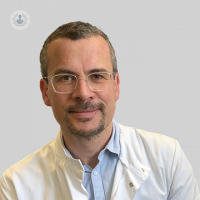What is personalised medicine?
Personalised medicine is a medical model that emphasises the importance of tailoring treatment to each individual patient according to their needs and circumstances. While this idea has existed for centuries, modern personalised medicine aims to use all the information available, including genetic analysis of the patient, using technological and scientific advances in genome sequencing. Another component of 'personalised medicine' is what is known as 'molecular profiling'. Molecular profiling is the process of classifying tumours, for example, based on their genetic profiles. This in turn helps to inform on how well that tumour might respond to certain therapies, as well as indicating the best way to treat that type of cancer.

Why is personalised medicine needed?
The philosophy of personalised medicine is that each person’s health is determined by a unique set of factors, including their individual genetic make-up, their lifestyle, and their environment. This means that, as we are all different, a treatment that works on one patient may not work for another with different circumstances.
What does personalised medicine involve?
Because of the inherent differences between each individual, personalised medicine analyses information about a patient’s genome and combines this with other clinical and diagnostic information to allow doctors to identify health risks for that patient, catch diseases early, and find the most effective treatments for that individual.
Benefits of personalised medicine
The traditional “one size fits all” approach of most healthcare systems can fail some patients if they do not respond to a particular treatment due to an unusual genetic, lifestyle, or environmental factor. Even normal differences, such as age, can have a bearing on the efficacy of a certain drug. Personalised medicine represents a move away from this approach. By recognising that each patient’s health is different and that factors such as genetics can mean that different patients respond differently to different treatments, doctors can analyse each patient’s unique set of circumstances to optimise treatment. In theory, this should lead to better outcomes for patients.
09-04-2018 08-03-2023Personalised medicine
Dr Mark Tuthill - Medical oncology
Created on: 09-04-2018
Updated on: 08-03-2023
Edited by: Kate Forristal
What is personalised medicine?
Personalised medicine is a medical model that emphasises the importance of tailoring treatment to each individual patient according to their needs and circumstances. While this idea has existed for centuries, modern personalised medicine aims to use all the information available, including genetic analysis of the patient, using technological and scientific advances in genome sequencing. Another component of 'personalised medicine' is what is known as 'molecular profiling'. Molecular profiling is the process of classifying tumours, for example, based on their genetic profiles. This in turn helps to inform on how well that tumour might respond to certain therapies, as well as indicating the best way to treat that type of cancer.

Why is personalised medicine needed?
The philosophy of personalised medicine is that each person’s health is determined by a unique set of factors, including their individual genetic make-up, their lifestyle, and their environment. This means that, as we are all different, a treatment that works on one patient may not work for another with different circumstances.
What does personalised medicine involve?
Because of the inherent differences between each individual, personalised medicine analyses information about a patient’s genome and combines this with other clinical and diagnostic information to allow doctors to identify health risks for that patient, catch diseases early, and find the most effective treatments for that individual.
Benefits of personalised medicine
The traditional “one size fits all” approach of most healthcare systems can fail some patients if they do not respond to a particular treatment due to an unusual genetic, lifestyle, or environmental factor. Even normal differences, such as age, can have a bearing on the efficacy of a certain drug. Personalised medicine represents a move away from this approach. By recognising that each patient’s health is different and that factors such as genetics can mean that different patients respond differently to different treatments, doctors can analyse each patient’s unique set of circumstances to optimise treatment. In theory, this should lead to better outcomes for patients.


Personalised medicine: How does DNA testing play a role in the prescription of medication?
By Dr Maciej Danilewicz
2024-12-16
Pharmacogenomic testing can assess how well a person may respond to a certain type of medication, helping practitioners to make more accurate and effective prescriptions for all types of health problems. In this informative article, revered consultant psychiatrist Dr Maciej Danilewicz tells us more about how this type of DNA testing and informed prescription can be applied to the field of psychiatry. See more


Navigating personalised healthcare
By Dr Natasha Patel
2024-12-08
In the contemporary healthcare landscape, there has been a notable shift from a standardised approach towards personalised care that caters to the unique requirements of each individual. Two significant methodologies embodying this transformation are precision medicine and functional medicine. Despite both aiming to deliver customised healthcare solutions, they adopt distinctive approaches. In her latest online article, Dr Natasha Patel delves into the disparities between precision medicine and functional medicine, offering insights into their methodologies and implications for one's health journey. See more
Experts in Personalised medicine
-
Dr Saifee Abbas Mullamitha
Medical oncologyExpert in:
- Colorectal cancer
- Bowel cancer
- Liver cancer
- Immunotherapy
- Clinical trials
- Personalised medicine
-
Dr Maciej Danilewicz
PsychiatryExpert in:
- Adult psychiatry
- Cognitive behavioural therapies
- Post-traumatic stress disorder (PTSD)
- Personalised medicine
- Anxiety
- Depression
-
Professor Andrew Wardley
Medical oncologyExpert in:
- Breast cancer
- BRCA gene
- Clinical trials
- Personalised medicine
- Cancer Pain
- Cancer
-
Dr Jay Naik
Medical oncologyExpert in:
- Breast cancer
- Immunotherapy
- Chemotherapy
- Personalised medicine
- Genetic testing
- Targeted therapy
-
Professor Marco Gerlinger
Medical oncologyExpert in:
- Colorectal cancer
- Oesophageal cancer
- Stomach cancer
- Immunotherapy
- Chemotherapy
- Personalised medicine
- See all

LOC at Chelsea (HCA)
LOC at Chelsea (HCA)
102 Sydney St, London
No existe teléfono en el centro.
By using the telephone number provided by TOP DOCTORS, you automatically agree to let us use your phone number for statistical and commercial purposes. For further information, read our Privacy Policy
Top Doctors

The Christie Private Care - part of HCA Healthcare
The Christie Private Care - part of HCA Healthcare
Wilmslow Rd, Withington, Manchester
No existe teléfono en el centro.
By using the telephone number provided by TOP DOCTORS, you automatically agree to let us use your phone number for statistical and commercial purposes. For further information, read our Privacy Policy
Top Doctors

LOC at London Bridge Hospital (HCA)
LOC at London Bridge Hospital (HCA)
Private Care at Guy's, Great Maze Road, London
No existe teléfono en el centro.
By using the telephone number provided by TOP DOCTORS, you automatically agree to let us use your phone number for statistical and commercial purposes. For further information, read our Privacy Policy
Top Doctors
-
LOC at Chelsea (HCA)
102 Sydney St, London, Central LondonExpert in:
- Cancer
- Breast Cancer
- Skin Cancer
- Prostate Cancer
- Kidney Cancer
- Thyroid cancer
-
The Christie Private Care - part of HCA Healthcare
Wilmslow Rd, Withington, Manchester , ManchesterExpert in:
- Brachytherapy
- Cancer
- Stem cells
- Cancer surgery
- Robotic Surgery
- Cancer screening clinic
-
LOC at London Bridge Hospital (HCA)
Private Care at Guy's, Great Maze Road, London, Central LondonExpert in:
- Cancer
- Intensive care
- Diagnosis of Cancer
- Diagnostic Imaging
- Chemotherapy
- Renal transplantation
- See all
- Most viewed diseases, medical tests, and treatments
- Immunotherapy
- Alzheimer's disease
- CAR-T cells
- Hormone therapy
- Maternal mental health
- Hodgkin's lymphoma
- Genetic testing
- Nipple discharge
- Head and neck cancer
- Skin biopsy








